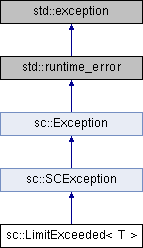sc::LimitExceeded< T > Class Template Reference
This is thrown when a limit is exceeded. More...
#include <util/misc/scexception.h>
Inheritance diagram for sc::LimitExceeded< T >:

Public Member Functions | |
| LimitExceeded (const char *description, const char *file, int line, T lim, T val, const ClassDesc *class_desc=0, const char *exception_type=strdup((std::string("LimitExceeded<")+std::string(typeid(T).name())+std::string(">")).c_str())) MPQC__NOEXCEPT | |
| Create a LimitExceeded exception. More... | |
| LimitExceeded (const LimitExceeded &ref) MPQC__NOEXCEPT | |
| T | tolerance () MPQC__NOEXCEPT |
| The limit which was exceeded. | |
| T | value () MPQC__NOEXCEPT |
| The value which exceeded the limit. | |
 Public Member Functions inherited from sc::SCException Public Member Functions inherited from sc::SCException | |
| SCException (const char *description=0, const char *file=0, int line=0, const ClassDesc *class_desc=0, const char *exception_type="SCException") MPQC__NOEXCEPT | |
| Create an SCException. More... | |
| SCException (const SCException &) MPQC__NOEXCEPT | |
| const char * | what () const MPQC__NOEXCEPT |
| overload of Exception::what() | |
| const ClassDesc * | class_desc () const MPQC__NOEXCEPT |
| Returns the class descriptor of the object which generated the exception. More... | |
| const char * | exception_type () const MPQC__NOEXCEPT |
| Returns the classname of the exception. May return null. | |
| std::ostream & | elaborate () |
| Returns a stream where additional information about the exception can be written. More... | |
 Public Member Functions inherited from sc::Exception Public Member Functions inherited from sc::Exception | |
| Exception (const char *description=0, const char *file=0, int line=0) MPQC__NOEXCEPT | |
| Create an Exception. More... | |
| Exception (const Exception &) MPQC__NOEXCEPT | |
| const char * | description () const MPQC__NOEXCEPT |
| Reimplementation of std::exception::what(). More... | |
| const char * | file () const MPQC__NOEXCEPT |
| Returns the name of the file in which the exception was created. More... | |
| int | line () const MPQC__NOEXCEPT |
| Returns the line number where the exception was created. More... | |
Detailed Description
template<class T>
class sc::LimitExceeded< T >
This is thrown when a limit is exceeded.
It is more general than ToleranceExceeded. For problems that are numerical in nature and use double types, then ToleranceExceeded should be used instead.
Constructor & Destructor Documentation
◆ LimitExceeded()
template<class T >
|
inline |
Create a LimitExceeded exception.
- Parameters
-
description a description of the problem. file the file name where the problem occured. line the line number where the exception occured. lim the limit. val the value which was obtained. class_desc the ClassDesc for the object causing the exception. exception_type the classname of the SCException specialization. The default is "LimitExceeded".
It is suggested that the special macros FILE and LINE be given as the file and line arguments, respectively.
References sc::SCException::elaborate().
The documentation for this class was generated from the following file:
- src/lib/util/misc/scexception.h